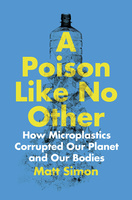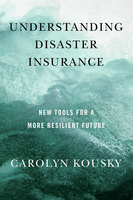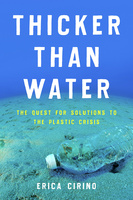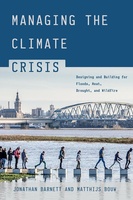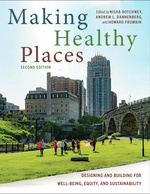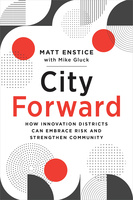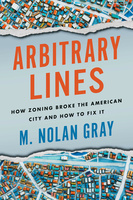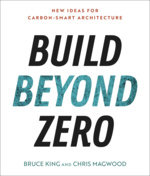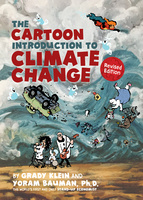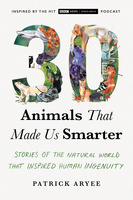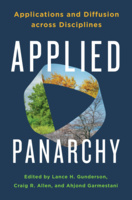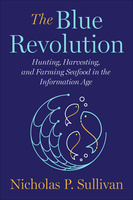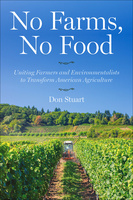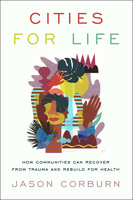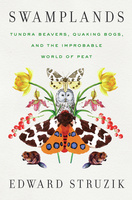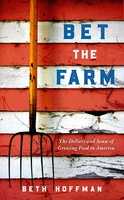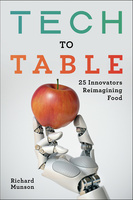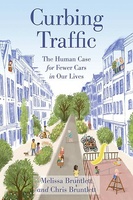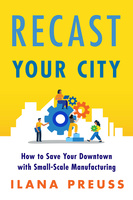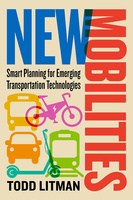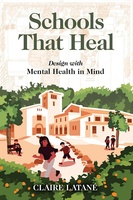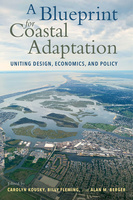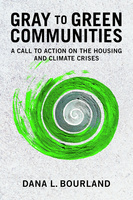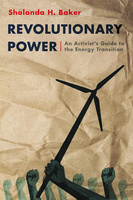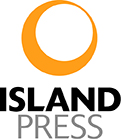
Island Press began with a simple idea: knowledge is power—the power to imagine a better future and find ways for getting us there. Founded in 1984, Island Press’ mission is to provide the best ideas and information to those seeking to understand and protect the environment and create solutions to its complex problems.
White Pine
The Natural and Human History of a Foundational American Tree
Roadways for People
Rethinking Transportation Planning and Engineering
Roadways for People is written to empower professionals and policymakers to create transportation solutions that serve people rather than cars.
The Progress Illusion
Reclaiming Our Future from the Fairytale of Economics
In The Progress Illusion, Jon Erickson charts the rise of the economic worldview and its infiltration into our daily lives as a theory of everything. Drawing on his experience as a young economist inoculated in the go-go 1980’s era of "greed is good," Erickson shows how flawed economic thinking shaped our politics and determined the course of American public policy.
While the history of economics is dismal indeed, Erickson is part of a vigorous reform effort grounded in the realities of life on a finite planet. Crafting a new economic story, he shows, is the first step toward turning away from endless growth and towards enduring prosperity.
A Poison Like No Other
How Microplastics Corrupted Our Planet and Our Bodies
“Informed, utterly blindsiding account.” - Booklist, starred review
It’s falling from the sky and is in the air we breathe. It’s in our food, our clothes, and our homes. It’s microplastic and it’s everywhere—including our own bodies. Scientists are just beginning to discover how these tiny particles threaten health, but the studies are alarming.
A Poison Like No Other is the first book to fully explore this new dimension of the plastic crisis. Matt Simon follows the intrepid scientists who travel to the ends of the earth and the bottom of the ocean to understand the consequences of our dependence on plastic. Unlike other pollutants that are single elements or simple chemical compounds, microplastics represent a cocktail of toxicity linked to diseases ranging from diabetes to cancer.
There is no easy fix, Simon warns. But we will never curb our plastic addiction until we begin to recognize the invisible particles all around us.
Understanding Disaster Insurance
New Tools for a More Resilient Future
Understanding Disaster Insurance is a useful guidebook for policymakers, innovators, students, and other decision makers working to secure a resilient future—and anyone affected by wind, fire, rain, or flood.
Thicker Than Water
The Quest for Solutions to the Plastic Crisis
Rural Renaissance
Revitalizing America’s Hometowns through Clean Power
Place and Prosperity
How Cities Help Us to Connect and Innovate
Fulton has been writing about cities over his forty-year career as a journalist, professor, mayor, planning director, and the director of an urban think tank in one of America’s great cities. Place and Prosperity is a curated collection of his writings with new and updated selections and framing material.
Fulton shows that at their best, cities not only inspire and uplift us, but they make our daily life more convenient, more fulfilling, and more prosperous.
Managing the Climate Crisis
Designing and Building for Floods, Heat, Drought, and Wildfire
Managing the Climate Crisis: Designing and Building for Floods, Heat, Drought and Wildfire by design and planning experts Jonathan Barnett and Matthijs Bouw is a practical guide to addressing this urgent national security problem. Barnett and Bouw draw from the latest scientific findings and include many recent, real-world examples to illustrate how to manage seven climate-related threats: flooding along coastlines, river flooding, flash floods from extreme rain events, drought, wildfire, long periods of high heat, and food shortages.
Making Healthy Places, Second Edition
Designing and Building for Well-Being, Equity, and Sustainability
Making Healthy Places is a must-read for students, academics, and professionals in health, architecture, urban planning, civil engineering, parks and recreation, and related fields.
City Forward
How Innovation Districts Can Embrace Risk and Strengthen Community
Institutional leadership, business owners, and professionals will find experienced direction here. City Forward is a refreshing look at the brighter futures that we can create through thoughtful collaboration—moving forward, together.
Arbitrary Lines
How Zoning Broke the American City and How to Fix It
Gray lays the groundwork for this ambitious cause by clearing up common misconceptions about how American cities regulate growth and examining four contemporary critiques of zoning (its role in increasing housing costs, restricting growth in our most productive cities, institutionalizing racial and economic segregation, and mandating sprawl). He sets out some of the efforts currently underway to reform zoning and charts how land-use regulation might work in the post-zoning American city.
Arbitrary Lines is an invitation to rethink the rules that will continue to shape American life—where we may live or work, who we may encounter, how we may travel. If the task seems daunting, the good news is that we have nowhere to go but up.
Build Beyond Zero
New Ideas for Carbon-Smart Architecture
Build Beyond Zero offers an exciting vision of climate-friendly architecture, along with practical advice for professionals working to address the carbon footprint of our built environment.
The Cartoon Introduction to Climate Change, Revised Edition
That creativity comes from the minds of Yoram Bauman, the world’s first and only “stand-up economist,” and award-winning illustrator Grady Klein. After seeing their book used in classrooms and the halls of Congress alike, the pair has teamed up again to fully update the guide with the latest scientific data.
Sociologists have argued that we don’t address climate change because it’s too big and frightening to get our heads around. The Cartoon Introduction to Climate Change takes the intimidation and gloom out of one of the most important challenges of our time.
A Road Running Southward
Following John Muir's Journey through an Endangered Land
"Engaging hybrid - part lyrical travelogue, part investigative journalism and part jeremiad, all shot through with droll humor." --The Atlanta Journal Constitution
In 1867, John Muir set out on foot to explore the botanical wonders of the South, from Kentucky to Florida. One hundred and fifty years later, veteran Atlanta reporter Dan Chapman recreated Muir’s journey to see for himself how nature has fared since Muir’s time. He uses humor, keen observation, and a deep love of place to celebrate the South’s natural riches. But he laments the long-simmering struggles over misused resources and seeks to discover how Southerners might balance surging population growth with protecting the natural beauty Muir found so special.
A Road Running Southward is part travelogue, part environmental cri de coeur—a passionate appeal to save one of the loveliest and most biodiverse regions of the world by understanding what we have to lose if we do nothing.
30 Animals That Made Us Smarter
Stories of the Natural World That Inspired Human Ingenuity
Applied Panarchy
Applications and Diffusion across Disciplines
Intended as a text for graduate courses in environmental sciences and related fields, Applied Panarchy picks up where Panarchy left off, inspiring new generations of scholars, researchers, and professionals to put its ideas to work in practical ways.
The Blue Revolution
Hunting, Harvesting, and Farming Seafood in the Information Age
Nicholas P. Sullivan presents this new way of thinking by profiling the people and policies transforming an aging industry into one fueled by “sea-foodies” and locavores interested in sustainable, traceable, quality seafood. The Blue Revolution brings encouraging news for conservationists and seafood lovers about the transformation of an industry historically averse to change, and it presents fresh inspiration for entrepreneurs and investors eager for new opportunities in a blue-green economy.
No Farms, No Food
Uniting Farmers and Environmentalists to Transform American Agriculture
With leadership from AFT, that constituency drove through Congress the first “Conservation Title” in the history of the U.S. Farm Bill; oversaw the development of agriculture conservation easement programs throughout the country; and continues to develop innovative approaches to sustainable agriculture.
No Farms, No Food is both an inspiring history of agricultural conservation and a practical guide to creating an effective advocacy organization. This is an essential read for everyone who cares about the future of our food, farms, and environment.
Effective Conservation
Parks, Rewilding, and Local Development
Effective Conservation is based on Jiménez’s experience managing conservation projects on three continents over thirty years. It guides readers through the practical considerations of designing, analyzing, and managing effective conservation programs. This highly readable manual, newly translated into English after successful Spanish and Portuguese editions, provides a practical, time-proven formula for successful conservation.
Healing Grounds
Climate, Justice, and the Deep Roots of Regenerative Farming
This, Carlisle shows, is the true regenerative agriculture: a holistic approach that values diversity in both plants and people. It has the power to combat climate change, but only if we reckon with agriculture’s history of oppression. Through rich storytelling, Carlisle lays bare that painful history, while lifting up the voices of farmers who are working to restore our soil, our climate, and our humanity.
Dream Play Build
Hands-On Community Engagement for Enduring Spaces and Places
For twenty years, James Rojas and John Kamp have been using art, creative expression, and storytelling to shake up the classic community meeting. In Dream Play Build, they share their insights into building common ground and inviting active participation among diverse groups. Their approach, “Place It!,” draws on three methods: the interactive model-building workshop, the pop-up, and site exploration using our senses. Inspirational and fun, this book celebrates the value of engaging with the dreams we have for our communities.
American Urbanist
How William H. Whyte's Unconventional Wisdom Reshaped Public Life
From the Ground Up
Local Efforts to Create Resilient Cities
Sant presents 12 case studies, drawn from research and over 90 interviews with people who are working in these communities to make a difference. These efforts show how US cities are reclaiming their streets from cars, restoring watersheds, growing forests, and adapting shorelines to improve people’s lives while addressing our changing climate.
From the Ground Up is a call to action. When we make the places we live more climate resilient, we need to acknowledge and address the history of social and racial injustice. Advocates, non-profit organizations, community-based groups, and government officials will find examples of how to build alliances to support and embolden this vision together.
Pathways to Success
Taking Conservation to Scale in Complex Systems
As environmental problems grow larger and more pressing, conservation work has increasingly emphasized broad approaches to combat global-scale crises of biodiversity loss, invasive species, and climate change. Pathways to Success is a modern guide to building large-scale transformative conservation programs capable of tackling the complex issues we now face.
In this strikingly illustrated volume, coauthors Nick Salafsky and Richard Margoluis walk readers through fundamental concepts of effective program-level design, helping them to think strategically about project coordination, funding, and stakeholder input. Pathways to Success is the definitive guide for conservation program managers and funders who want to increase the effectiveness of their work combating climate change, species extinctions, and the many challenges we face to keep our planet livable.
Cities for Life
How Communities Can Recover from Trauma and Rebuild for Health
In Cities for Life, public health expert Jason Corburn shares lessons from three of these cities: Richmond, California; Medellín, Colombia; and Nairobi, Kenya. Corburn draws from his work with citizens, activists, and decision-makers in these cities over a ten-year period, as individuals and communities worked to heal from trauma—including from gun violence, housing and food insecurity, poverty, and other harms. Cities for Life is about a new way forward with urban communities that rebuilds our social institutions, practices, and policies to be more focused on healing and health.
Autonorama
The Illusory Promise of High-Tech Driving
Norton takes the reader on an engaging ride—from the GM Futurama exhibit to “smart” highways and vehicles—to show how we are once again being sold car dependency in the guise of mobility.
Autonorama is hopeful, advocating for wise, proven, humane mobility that we can invest in now, without waiting for technology that is forever just out of reach.
Swamplands
Tundra Beavers, Quaking Bogs, and the Improbable World of Peat
In a world filled with breathtaking beauty, we have often overlooked the elusive magic of certain landscapes. A cloudy river flows into an Arctic wetland where sandhill cranes and muskoxen dwell. Further south, cypress branches hang low over dismal swamps. Places like these–collectively known as swamplands or peatlands–often go unnoticed for their ecological splendor. They are as globally significant as rainforests and have an important role to play in addressing climate change, yet, because of their reputation as wastelands, they are being systematically drained and degraded.
Swamplands celebrates these wild places, as journalist Edward Struzik highlights the unappreciated struggle to save peatlands by scientists, conservationists, and landowners around the world. An ode to peaty landscapes in all their offbeat glory, the book is also a demand for awareness of the myriad threats they face. It inspires us to see the beauty and importance in these least likely of places. Our planet’s survival might depend on it.
Bet the Farm
The Dollars and Sense of Growing Food in America
In her late 40s, Beth Hoffman decided to upend her comfortable life as a professor and journalist to move to her husband’s family ranch in Iowa—all for the dream of becoming a farmer. There was just one problem: money. Half of America's two million farms made less than $300 in 2019, and many struggle just to stay afloat.
Bet the Farm chronicles this struggle through Beth’s eyes. She must contend with her father-in-law, who is reluctant to hand over control of the land. Growing oats is good for the environment but ends up being very bad for the wallet. And finding somewhere, in the midst of COVID-19, to slaughter grass finished beef is a nightmare.
If Beth can’t make it, how can farmers who confront racism, lack access to land, or don’t have other jobs to fall back on hack it? Bet the Farm is a first-hand account of the perils of farming today and a personal exploration of more just and sustainable ways of producing food.
Tech to Table
25 Innovators Reimagining Food
Tech to Table introduces readers to twenty-five of the most creative entrepreneurs innovating these solutions. They come from various places and professions, identities and backgrounds. But they share an outsider’s perspective and an idealistic, often disruptive, ambition to reinvent the food system.
The pace and breadth of change is astonishing, as investors pump billions of dollars into ag-tech. Not every innovator will prosper long-term, but each marks a fundamental change in our approach to feeding a growing population—sustainably.
A Good Drink
In Pursuit of Sustainable Spirits
“Insightful tour de force… Farrell’s writing is as informative as it is intoxicating” -- Publishers Weekly
As a bartender, Shanna Farrell not only poured spirits, but learned their stories—who made them and how. In A Good Drink, Farrell goes in search of the bars, distillers, and farmers who are driving a transformation to sustainable spirits. She meets mezcaleros in Guadalajara who are working to preserve traditional ways of producing mezcal; a London bar owner who has eliminated individual bottles and ice; and distillers in South Carolina who are bringing a rare variety of corn back from near extinction, among many others.
For readers who have ever wondered who grew the pears that went into their brandy or why their cocktail is an unnatural shade of red, A Good Drink will be an eye-opening tour of the spirits industry. For anyone who cares about the future of the planet, it offers a hopeful vision of change, one pour at a time.
Trains, Buses, People, Second Edition
An Opinionated Atlas of US and Canadian Transit
In Trains, Buses, People, Second Edition: An Opinionated Atlas of US and Canadian Transit, Spieler profiles the 49 metropolitan areas in the US and eight metropolitan areas in Canada that have rail transit or BRT, using data, photos, and maps for easy comparison. The best and worst systems are ranked and Spieler offers analysis of how geography, politics, and history complicate transit planning.
Trains, Buses, People, Second Edition will help any citizen, professional, or policymaker with a vested interest evaluate a transit proposal and understand what makes transit effective and how to make it inclusive.
The Uncommon Knowledge of Elinor Ostrom
Essential Lessons for Collective Action
In The Uncommon Knowledge of Elinor Ostrom, author Erik Nordman brings to life Ostrom’s brilliant mind. Ostrom’s research proved that people can and do act in collective interest, and her ideas about common resources have played out around the world, from Maine lobster fisheries to taxicab use in Nairobi. Ostrom broke barriers at a time when women were regularly excluded from academia. Her message of shared collective action is more relevant than ever for solving today’s most pressing environmental problems.
Curbing Traffic
The Human Case for Fewer Cars in Our Lives
Their insights will help decision makers and advocates to better understand and communicate the human impacts of low-car cities: lower anxiety and stress, increased independence, social autonomy, inclusion, and improved mental and physical wellbeing.
Curbing Traffic provides relatable, emotional, and personal reasons why it matters and inspiration for exporting the low-car city.
Recast Your City
How to Save Your Downtown with Small-Scale Manufacturing
Preuss draws from her experience working with local governments, large and small, from Knoxville, Tennessee, to Columbia, Missouri, to Fremont, California. She provides tools, such as her five-step method for recasting your city, that local leaders in government, business, and real estate as well as entrepreneurs and advocates in every community can use.
New Mobilities
Smart Planning for Emerging Transportation Technologies
Public policies around New Mobilities can either help create heaven, a well-planned transportation system that uses new technologies intelligently, or hell, a poorly planned transportation system that is overwhelmed by conflicting and costly, unhealthy, and inequitable modes. His expert analysis will help planners, local policymakers, and concerned citizens to make informed choices about the New Mobility revolution.
The Economics of Sustainable Food
Smart Policies for Health and the Planet
The Economics of Sustainable Food details the true cost of food for people and the planet. It illustrates how to transform our broken system, alleviating its severe financial and human burden. The key is smart macroeconomic policy that moves us toward methods that protect the environment like regenerative land and sea farming, low-impact urban farming, and alternative protein farming, and toward healthy diets. The book’s multidisciplinary team of authors lay out detailed fiscal and trade policies, as well as structural reforms, to achieve those goals.
Schools That Heal
Design with Mental Health in Mind
Overtourism
Lessons for a Better Future
Overtourism: Lessons for a Better Future charts a path toward tourism that is truly sustainable, focusing on the triple bottom line of people, planet, and prosperity. This practical book examines the causes and effects of overtourism before turning to emerging management strategies. Visitor education, traffic planning, and redirection to lesser known sites are among the measures that can protect the economic benefit of tourism without overwhelming local communities.
As tourism revives around the world, these innovations will guide government agencies, parks officials, site managers, civic groups, environmental NGOs, tourism operators, and others with a stake in protecting our most iconic places.
A Blueprint for Coastal Adaptation
Uniting Design, Economics, and Policy
Getting to the Heart of Science Communication
A Guide to Effective Engagement
In Getting to the Heart of Science Communication, Faith Kearns has penned a succinct guide for navigating the human relationships critical to the success of practice-based science. This meticulously researched volume takes science communication to the next level, helping scientists to see the value of listening as well as talking, understanding power dynamics in relationships, and addressing the roles of trauma, loss, grief, and healing.
Building Community Food Webs
Network-building takes a variety of forms and arises out of multiple activities. Farmers and researchers may convene to improve farming practices collaboratively. Food banks engage their clients to challenge the root causes of poverty. Municipalities invest large sums to protect farmland from development.
Building Community Food Webs captures the essence of these efforts, and offers pragmatic insights for community food leaders anywhere.
Flames of Extinction
The Race to Save Australia's Threatened Wildlife
Rewilding Agricultural Landscapes
A California Study in Rebalancing the Needs of People and Nature
This accessibly written, groundbreaking contributed volume is the first to examine in detail what it would take to retire eligible farmland and restore functioning natural ecosystems. The lessons in Rewilding Agricultural Landscapes will be useful to conservation leaders, policymakers, groundwater agencies, and water managers looking for inspiration and practical advice for solving the complicated issues of agricultural sustainability and water management.
Reinventing Food Banks and Pantries
New Tools to End Hunger
The Monsanto Papers
Deadly Secrets, Corporate Corruption, and One Man’s Search for Justice
Gray to Green Communities
A Call to Action on the Housing and Climate Crises
Bourland draws from her experience leading the Green Communities Program at Enterprise Community Partners, which resulted in the first standard for green affordable housing.
The book opens with the potential of green affordable housing, followed by the problems that it is helping to solve, challenges in the approach that need to be overcome, and recommendations for the future of green affordable housing. Gray to Green Communities brings together stories from the people and projects of the Green Communities’ program.
Gray to Green Communities will empower and inspire anyone interested in the future of housing and our planet.
Revolutionary Power
An Activist's Guide to the Energy Transition
Baker provides a playbook for the energy transformation complete with a step-by-step analysis of the key energy policy areas that are ripe for intervention. She tells the stories of those who are working to be architects of a more just system and draws from her own experience as an energy-justice advocate, a lawyer, and a queer woman of color.
Revolutionary Power is the guide to a just energy transformation.
Leadership for Sustainability
Strategies for Tackling Wicked Problems
Leadership for Sustainability gives readers perspective and skills for promoting creative and collaborative solutions. Blending systems thinking approaches with leadership techniques, it offers dozens of strategies and specific practices, illustrated by inspiring case studies. Readers will come away with a holistic understanding of how to lead from where they are by applying leadership principles and practices to a wide range of wicked situations.




